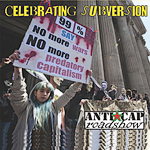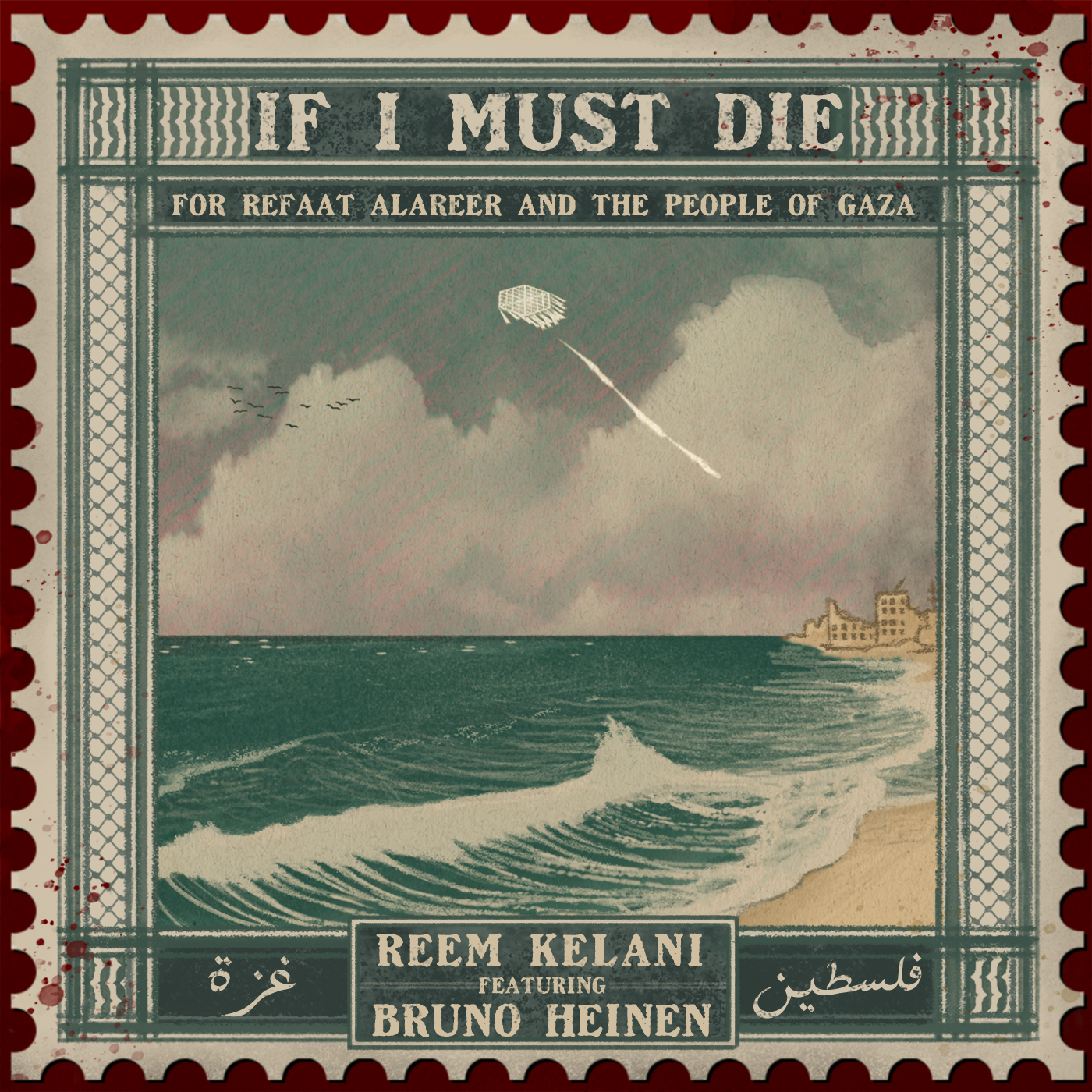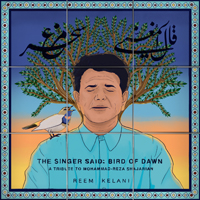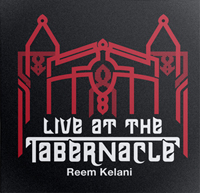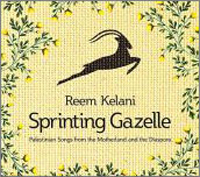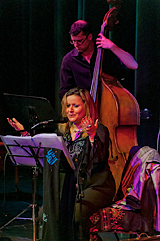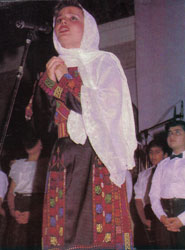THE SINGER SAID: BIRD OF DAWN
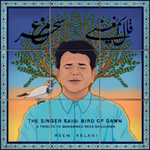
Reem released her latest EP in 2022. It is her tribute to the great Iranian singing master, Mohammad-Reza Shajarian (1940-2020). Typical with all her recording work, Reem has produced a detailed and comprehensive trilingual booklet (Arabic, English & Farsi) with musicological notes, literary translations and a detailed glossary.
This is part of Reem's ongoing project This Land is Your Land, about the music of the various communities with whom she lived in Kuwait, and amongst whom she now lives in the UK. Reem and her band recorded their parts separately (both in the UK and the US) during lockdown in 2021.
"One of (Reem's) other talents….. is that she is a short storywriter. The way that she puts (the EP) together and wraps it up in her own life story is just brilliant."
Max Reinhardt, Soho Radio, 17 June 2022
Kelani's talent lies in being able to infuse her work with a high level of emotion without falling into the trap of becoming melodramatic."
Richard Marcus, Qantara, Deutsche Welle, Germany, 06 May 2022
"True to style, Kelani has produced a highly informative tri-lingual accompanying booklet (in English, Arabic and Farsi), 30 pages in length and exquisitely illustrated… It is a real gem." [transl.]
Maja Vasiljevic, Rumbo al Este, RTVE, Spain, 20 April 2022
Tune here to listen to Max Reinhardt's interview of Reem on Soho Radio on 17 June 2022 which features her EP tribute to Mohammad-Reza Shajarian
WHY DO I LOVE HER?
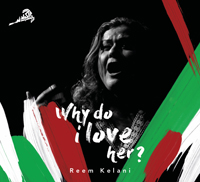
LIVE AT THE TABERNACLE
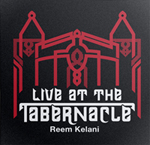
The Palestinian singer, musician and broadcaster Reem Kelani released her second CD in March 2016.
Entitled Reem Kelani: Live at the Tabernacle, the album comprises a live recording of Reem’s concert at the Tabernacle, London W11, on 22 November 2012. The concert formed part of Kensington & Chelsea’s Nour Festival, organised that year by Alan Kirwan. The album consists of two CD’s, with almost 80 minutes of playing time.
Each CD includes a PDF of the album booklet, which can be opened on your computer. The first CD also includes a short promotional film by the Venezuelan film maker Ignacio Crespo Valdez, in which Reem talks about her music and about the making of this album. Manchester-based Adam Orton provided the animation for the ‘sprinting gazelle’ motif on the promotional video.
The second CD includes a specially edited excerpt from the French film--maker, Axel Salvatori-Sinz’s award-winning documentary film"Les Chebabs de Yarmouk", for which Reem composed the title music “Yarmouk”. The lyrics of the song were penned by Iyad Hayatleh, the Glasgow based Palestinian poet and son of Yarmouk refugee camp in Damascus.
The songs which Reem performed on the night encompassed some old favourites from her 2006 classic “Sprinting Gazelle: Palestinian Songs from the Motherland and the Diaspora”, as well as several presentations from her on-going project on the great Egyptian composer Sayyid Darwish (1892-1923). Reem’s set also included new Palestinian songs, plus a Tunisian track from her collaboration album with the Anti-Capitalist Roadshow (featuring Leon Rosselson, Roy Bailey, Peggy Seeger & Robb Johnson, amongst others).
Reem’s band at the Tabernacle concert included a Jazz rhythm section comprising Bruno Heinen on piano, Ryan Trebilcock on double bass and Antonio Fusco on drums and percussion. The concert also featured a guest appearance by the acclaimed Palestinian musician Tamer Abu Ghazaleh on ‘oud.
Over the years, Reem has introduced many non-Arab musicians to the theory and practice of Arabic music, including the exceptional rhythm section which accompanied her in this concert. Moreover, she has facilitated opportunities for her band members to work with musicians from Palestine, Syria, Egypt, Turkey and Iran.
The concert was faithfully recorded by Gurjit Dhinsa, who acted as assistant engineer on Reem’s Sprinting Gazelle album, and the recording was later edited by Steve Lowe, who was the principal engineer on her debut album. With his expertise, diligence and patience, Steve has played a vital role in helping Reem to bring her music to the enjoyment of a wider public.
Alongside the aural experience of this memorable concert, Reem has, in keeping with the standards she set herself on her debut album, provided in the 60-page booklet detailed historical and musicological notes on each song, plus the lyrics, in Arabic and translated into English (under the supervision of Palestinian poet and literary historian Salma Khadra Jayyusi). There is also a glossary of musical and cultural terms.
The design and layout of the media book and sleeve notes was done by the talented Egyptian graphic designer, Nora el-Gazzar. She worked tirelessly to develop Reem’s concept into masterful design reality.
For the continuing support, paternal care and practical assistance given by the great songwriter Leon Rosselson, we owe so much. Like Sprinting Gazelle before it, this album is published courtesy of his Fuse Records.
Lastly, we salute the 148 Kickstarter pledgers, who answered our call for help, and without whose funding the album would not have seen the light of day: grassroots support, without conditions and in the service of independent art.
Reem sees her albums as a project, not as a product. Her field trips, research into the songs, their arrangement and performance, plus the literary and creative work which go into her albums take much time and energy, inevitably. It was during one of Reem’s field trips to Egypt, researching some of these very songs, that Reem found herself in the middle of the Egyptian revolution. She later reported on the music of the revolutionaries in Tahrir Square in her radio documentary ‘Songs for Tahrir’ on BBC Radio 4.
Add to this, Reem is continuing to work on a new album of Palestinian songs, a duo project with Jazz pianist Bruno Heinen, and on her vast project on the Egyptian composer Sayyid Darwish. She has also been involved in special performances, including:
· as a soloist in Sir Karl Jenkins’ Stabat Mater at the Royal Albert Hall in 2015, alongside the Royal Philharmonic orchestra and the London Philharmonic choir;
· as a soloist in Orlando Gough’s composition Stemmer, which was premiered at Bergen National Opera with the Bergen Philharmonic orchestra in 2014;
· with the acclaimed Turkish collective Kardeş Türküler (Songs of Fraternity).
And finally, Reem continues to devote much effort to workshops, master classes and presentations in schools and colleges and with community groups and choirs.
"[Reem Kelani's] off-mic introduction turned out to be an endearingly apt overture to a performance in which she combined restless energy with vigorous political engagement, persuasive audience involvement and an illustrated, impressively far-reaching musicological dissertation." Rob Adams, The Herald Scotland, January 2016
The Palestinian singer, musician and broadcaster Reem Kelani released her debut CD in February 2006
Born in Manchester in the UK and brought up in Kuwait, Reem’s father comes from Ya’bad near Jenin and her mother from Nazareth in Galilee. Reem enjoyed early exposure to all sorts of music. She learnt the piano and listened to the Jazz standards her father used to sing at home. She studied the Qur’an as a child and used to hear the calls to prayer about her in Kuwait. Life in the Diaspora also meant that she was exposed to the music of the Arabian Peninsula, Iran, East Africa, the Levant and Egypt. It was whilst at a family wedding in the Galilee that Reem, as a child, was first taken by Palestinian music.
Reem has been recording and collating folk songs from women in her maternal home of Nazareth, in the refugee camps of Palestine and Lebanon and elsewhere in the Diaspora. Now considered as one of the foremost researchers and performers of Palestinian music, Reem Kelani brings you ‘Sprinting Gazelle – Palestinian Songs from the Motherland and the Diaspora.’ Some of the songs on the CD are Reem’s research and arrangement of traditional (and some very old) Palestinian songs; the others are her own musical settings of popular and resistance poetry by the likes of Mahmoud Darwish, Salma Khadra Jayyusi, Rashid Husain and Mahmoud Salim al-Hout.
Reem’s band includes a Jazz rhythm section comprising Zoe Rahman on piano, Idris Rahman on tenor saxophone, clarinet and bass clarinet, Oli Hayhurst on double bass and Patrick Illingworth on drums. Egyptian violinist Samy Bishai and Iranian percussionist Fariborz Kiani complete the line-up.
Other artists on this CD include: Armenian duduk player Tigran Aleksanyan (playing the ancient and haunting Palestinian double-clarinet the yarghul); film-composer Dirk Campbell (who lends his string arrangements and nay playing); Salah Dawson Miller (on Arabic percussion); Paul Clarvis (on drums and frame drums), and Sonia Slany with her Solid Strings Quartet.
Reem Kelani sees her project as a means of demonstrating the fact of the Palestinians’ existence, now and in the past. She views her musical journey as both historical and political, personal and collective. She seeks to point out suffering and to highlight celebration. Her journey is a musical one through the written and oral history of a people who are proud of their collective sense of poetry, stories, music and existence. This is manifested in the detailed accompanying booklet which includes introductory notes for each song, lyrics in Arabic and English, and a comprehensive glossary of musical and cultural terms.
Leon Rosselson of Fuse Records offered his advice and his record label. This gave Reem the opportunity to produce the CD herself, thus maintaining her musical and cultural integrity and her independence. Raising the necessary funds for the project was by no means easy, but with the help of friends, family and supporters, the CD was finally made. It took two years in the process and is the culmination of more than 20 years of effort and hope.
Enjoy your journey with the Sprinting Gazelle!
“Reem Kelani is Palestinian but her vocal style seems to effortlessly transcend any boundaries. ”Time Out, London
“An extraordinary musical map of Palestine emerges from her work, more vibrant than any historical document.” The Guardian
“Reem Kelani's voice will make the hairs on your neck stand up." Jazz UK
“Her voice is holy, strong and seductive, like a call to prayer." Evening Standard “Rarely has the entire tragedy of a people been condensed into artful melodrama by such a powerful and stirring voice.” Frankfurter Allgemeine Zeitung, Germany
“Reem Kelani is a national treasure of talent, art and a deep sense of belonging."
Al-Quds, London & Al-Ayyaam, Ramallah, Palestine
CD: “Sprinting Gazelle - Palestinian Songs from the Motherland and the Diaspora” My decade-long project on the Egyptian composer Sayyid Darwish (1892 -1923) continues. Considered by many to be the father of contemporary Arabic music, Sayyid Darwish is little known outside the Arab world and under-appreciated in many circles within it. I still hope to produce a triple CD, with detailed musicological and historical notes, but I will need rather more time to complete the work. I have drawn much from my field trips in Syria (2009) and Turkey (2010). The latter visit was especially important as I am keen to bridge the gap in communication and understanding which seems to have developed between Turkish and Arabic music scholars. After all, Sayyid Darwish's mentor during his two years in Aleppo (1912 - 1914) was the Iraqi Mulla 'Uthman al-Musilli, who was a reader of Qur'an at the court of the Ottoman Sultan. Glorious and invigorating as the revolution of 2011 was in Egypt, the ensuing chaos and often brutal repression which we have seen since then has set the project back. At the same time, the revolution was a reminder of the very topicality of Sayyid Darwish - his music and his message. It was, after all, his songs which dominated the protests in Tahrir Square in Cairo and elsewhere. He would have been so proud to think that his songs provided the backdrop to the two most important popular uprisings in modern Egyptian history, namely the '1919' Egyptian Revolt against the British Protectorate and the Revolution of 25th January 2011. This was the theme I developed in the programme I wrote and presented for BBC Radio 4: Songs for Tahrir. This project is daunting in its scale and has already shown the inadequacy of my resources. To those who had hoped to have received this album by now, I ask for their patience. Those of you who have attended my concerts and workshops in recent years will, at least, already have had an introduction from me to the majesty of Darwish's music. One hundred and eighteen years have passed since the birth of Sayyid Darwish, without any official celebration (of his life and work). We haven’t seen any play about him at the Opera House, nor have we heard Egyptian radio dedicate a day to the broadcast of his brilliant music; nor has Egyptian state television dedicated a programme to a giant who did so much to build and fashion modern Egyptian music. I need hardly mention that Darwish also established Egyptian musical theatre and gave his heart and soul to marginalised groups such as white- and blue-collar workers, salesmen, street cleaners and labourers. As he once sang of them: "Who’s seen more misery than those wretched workmen?" Darwish’s anniversary has passed unnoticed and yet he is the one who gave us the national anthem in its modern Arabic form, and who gave us anthems that symbolised the 1919 Egyptian Revolution; anthems which inspired resistance against British colonial rule. Darwish championed the liberation of Egyptian women; he didn’t leave anyone without inspiring them with his brilliant music. The residents of his Alexandrian birthplace, the old neighbourhood of Kom el-Dikka, were the only ones who took the initiative and celebrated his birthday, aided by two local cafes, "Qahwet Farag" and "Qahwet ‘Abd el-Mun‘im". We have repeatedly asked the Opera House to present Sayyid Darwish’s work, with a smaller budget than what it would normally spend on snacks at a festival. And yet this is the Opera House which last year openly embraced a controversial Israeli musician, while remaining shut in the face of one of Egypt’s own sons. Egyptian poet Salah Jahin once described Darwish as being: "Just like a jinn... Neither resting nor tiring.... Like a tightly stretched string... Strummed over a thousand years ago... Still emitting a tune." The Opera House has erected in pride of place two statues, one of Umm Kulthum and the other of Muhammad ‘Abd al-Wahhab, while it has no statue of Sayyid Darwish standing proud in its grounds. Yet, it was Darwish who established musical theatre. Isn’t theatre part of the world of opera, I wonder? For all this, the state continues to ignore the urgent need to develop Darwish’s dilapidated Cairo home into a museum worthy of his great works. I can’t explain this injustice except that the state fears anything which might remind us of the revolutionary episodes in our history. Similarly, Darwish’s librettist Badi‘ Khayri’s poetry is seen as a threat to the current status quo. And thus, the state seeks to avoid the risk of a brilliant man’s subversive fire becoming a focus for present day anger. Instead of parading him as a cultural icon, the state and the Ministry of Culture have succeeded in suppressing Sayyid Darwish’s legacy and making sure that few will ever appreciate his significance and his worth.
In spite of this, the "Association of the Friends of Sayyid Darwish’s Music" continue to carry his banner. It was founded in 1947 by such luminaries as Yusef Hilmi, Tawfiq al-Hakim, ‘Abbas al-‘Aqqad, Badi‘ Khayri, Bayram al-Tunisi, Umm Kulthum, Zakariyya Ahmad, Riyad Sunbati, Muhammad al-Qasabji, and many others. The Association’s General Secretary is none other than Muhammad Hasan Sayyid Darwish, grandson of the great musician, and its Chairman is Ibrahim Hajji. The Association took it upon itself to teach a choir of young singers the repertoire of Sayyid Darwish, and they participated in a series of commemorative concerts. They also succeeded in creating a comprehensive record of the great man’s works. For forty years, the Association has occupied a room in the Cairo Atelier, of which the Egyptian visual artist, Dr. Salah ‘Anani, recently became head. ‘Anani is now demanding that the Association give up its room, its only refuge, and move into an even smaller room that isn’t large enough for choir practice, let alone anything else. I can’t believe that the Cairo Atelier, which was established as a private initiative by a group of "writers and intellectuals" is now seeking to kick out the lovers of Sayyid Darwish’s music. More incredible still, the head of the Atelier is a visual artist and an intellectual himself.
I had expected the opposite, in fact, and had hoped that the Atelier’s board of directors would invite the Association to a meeting to discuss other ways in which the Atelier might support it.
I can’t bear to think that the "People’s Artist" is being thrown out of his last remaining sanctuary in Cairo. Unless, of course, Egypt is becoming the cat that eats its own litter, the very offspring who once stirred in her heart dreams of freedom, development and independence.
Ahmad Al-Khamissi, Egyptian writer Translated by: Reem Kelani & Christopher Somes-Charlton The Anti-Capitalist Roadshow is a collective of singers and songwriters Frankie Armstrong, Roy Bailey, Robb Johnson, Reem Kelani, Sandra Kerr, Grace Petrie, Leon Rosselson, Janet Russell, Peggy Seeger, Jim Woodland plus one (there is only one) socialist magician, Ian Saville. It began with the Occupy movement and the overwhelming sense that this millionaire government was imposing an ideologically driven austerity programme on all but the elite, and in particular on the poor, the vulnerable and the disabled. In response, we have brought our songs and magic to enthusiastic audiences across the UK with the humble aim of raising spirits and giving hope and heart and a smile or two to those angry at this injustice. We are part of the resistance to a capitalism that functions only on behalf of the wealthy, that aims to shrink the public sphere and privatise public services, including the NHS, and that is destructive to the planet. We are part of another way of looking at the world. This compilation album ranges widely: from the music hall humour and cheery chorus of Robb Johnson's (Make the rich pay) Why Not? to Jim Woodland's angry picturing of the North South divide in The Grapes of Wrath; from Leon Rosselson's wry, sharply-written take on last year's riots in Looters to Grace Petrie's deft weaving of the personal with the political in Maggie Thatcher's Dream; from Roy Bailey's heart-warming singing of Si Kahn's solidarity songs to Reem Kelani's heart-rending performance of a song from Tunisia about the pain of worker migration; from Sandra Kerr's perceptive warning against the privatisation of the NHS to Ian Saville's visionary tribute to those who never surrendered their dreams of making a better world; from Janet Russell's satirical attack on the arms trade to Peggy Seeger's feisty anthem for the Occupy Movement to Frankie Armstrong's powerful presentation of the Brecht/Eisler song Proletarian Lullaby, a call for class solidarity which closes the collection. Eleven different voices with one aim - to challenge the narrative that says ‘There is no alternative’. It is released on behalf of the Anti-Capitalist Roadshow collective by Fuse Records: http://www.leonrosselson.co.uk and is distributed by Proper Music Distribution: http://www.properdistribution.com. For further information, including links to artists’ websites and forthcoming gig dates by the collective, go to: http://www.anticapitalistroadshow.co.uk. To buy a digital copy of the Anti-Capitalist Roadshow album, go to: Amazon - Anti-Capitalist Roadshow.SPRINTING GAZELLE
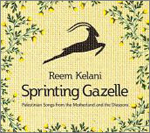
Plaudits
Press Release
Label: Fuse Records
Produced by: Reem Kelani
Distributor: Proper Music Distribution
Release Date: 06 February 2006
Sayyid Darwish
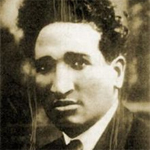
Update from Reem
Sayyid Darwish: National genius; official outcast
© Ahmad Al-Khamissi, Cairo, April 2010
© The Miktab Limited, London, June 2010Anti-Capitalist Roadshow
